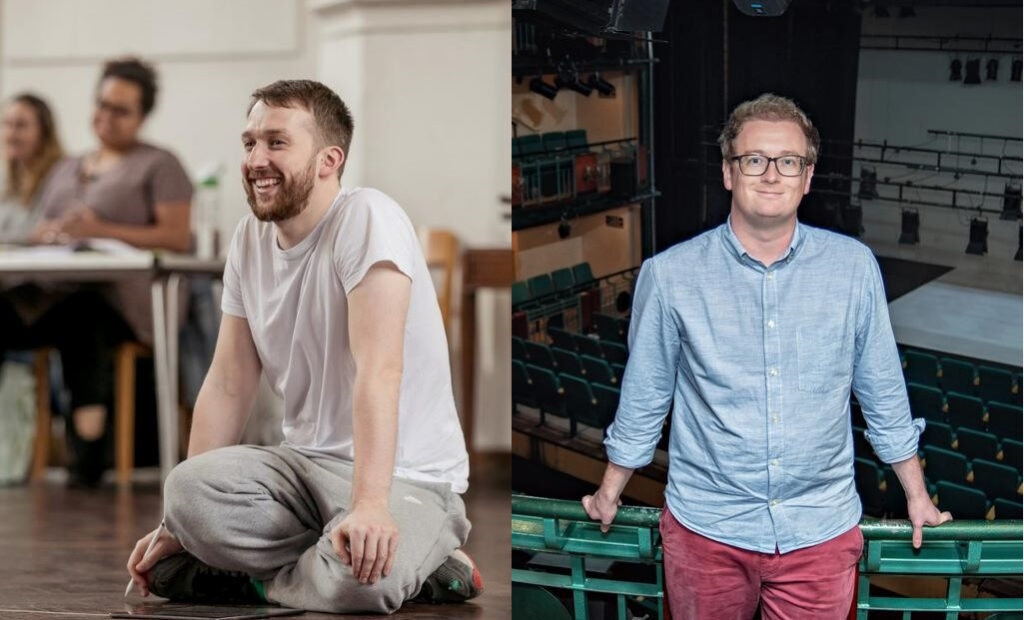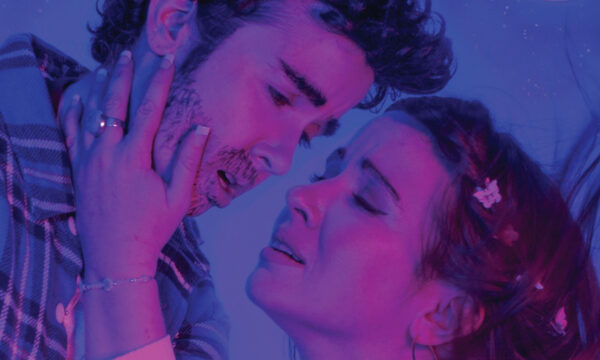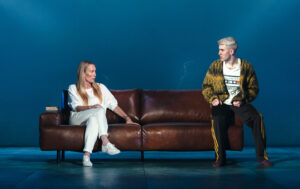“A huge amount of nostalgia is guaranteed”: An interview with Toast writer Henry Filloux-Bennett and director Jonnie Riordan

Henry Filloux-Bennett is a playwright, director and producer, and director and chief executive of the Lawrence Batley Theatre. Jonnie Riordan is a theatre director and movement director, and Associate Artistic Director of ThickSkin. Having originally adapted it for the stage in 2018, Filloux-Bennett and Riordan have teamed up once more to bring the critically-acclaimed play of Nigel Slater’s book Toast straight to the homes of their audience, in the form of part animation and part radio play.
We caught up with them to discuss the inspiration and motivation to re-adapt Slater’s story, as well as the challenges of working in lockdown.
Thank you both for your time. Henry, you have said before that theatre allowed you to stay closer to the book than the 2011 TV adaptation, which has more elements of comedy and so deviates from the original story. Can you comment more on that?
Henry Filloux-Bennett: I only actually watched the TV adaptation for the first time a couple of weeks ago when I discovered it on Amazon Prime – but I was aware that it was made for a relatively family-friendly festive schedule slot, and that is the thing that has made adapting Toast for the theatre a lot less restrictive. The book, although full of complete joy, does look at some fairly bleak topics, and I think adapting it for the stage gave us permission to explore some of those things without needing to worry about upsetting anyone.
What made you decide to adapt the story into an online play?
HFB: We tried creating our first online play – The Understudy – as soon as lockdown started, and based on how well it was received we thought it would be great to bring Toast back too. We had a great creative team to deliver it and most of the actors had already been a part of The Understudy, so we had the recording kit ready to go!
The script has evolved over its various productions, from the Edinburgh Fringe to the West End. Can you tell us a little about the writing process of the online play and the changes to the script – what did you have to take out and what is new?
HFB: Luckily very little of the script has had to change. Because of the way we presented the play in the first place, with Nigel addressing the audience and essentially narrating throughout, actually it was incredibly easy to turn it in to something that could live online with animation. We haven’t taken out any scenes at all – we’ve just tweaked a few lines for things that were originally based on visual cues.
Is it very different from how you imagined it to be?
HFB: Having seen what Dusthouse were able to do with The Understudy, although I had absolutely no idea what Toast might look like, I was completely sure that I would love it – and I do! They have completely captured the warmth of the book – it looks (and sounds) completely beautiful.
Jonnie, can you tell us about the effects of recording in isolation and the challenges you faced?
Jonnie Riordan: It’s been fascinating. We’re incredibly lucky to have a cast that have really lived with Toast from the beginning, so the characters are really clear for us as a team and recording in isolation isn’t quite as tricky as it could be with a new script. That being said, I’ve loved getting photos and texts from the company in their makeshift recording studios, they look like they’ve had to build the kind of forts that you would as a child and hide away in them, which, for telling a story that is about childhood nostalgia, is pretty perfect.
The task is epic for the sound team at Bird House Studios. Alex Faye Braithwaite (who provided the original compositions for the stage show) and Annie May Fletcher have had a huge task in stitching the vocal tracks together and layering in the sound design. Each actor initially records three takes per page and then our job is to find the delivery we like the best, but also that will compliment the other actor that they’re performing with in that moment. After we made the choices and I received the first “stitch”, all I kept saying was: “That’s magic!” You really forget that everyone’s been working independently.
Overall, in what has been a really worrying time for everyone in the industry, there has been something so calming about working with a company and text that we have such huge love for.
A big factor of the theatre production was the smells and tastes of the play. How have you provoked the same emotions triggered by the senses without the physicality of space?
JR: What I always remember from rehearsals for the live version is that the hour before lunch was always excruciating. When the source material constantly references another food item, you could hear people’s bellies rumbling. The tagline for the original memoir was “the story of a boy’s hunger”, so I always enjoyed that it had that same hungering effect on the cast and the audiences.
I have a photo of me waving burnt toast around in the air at the Lowry two years ago before the audience entered so they walked in and were instantly hit with something sensory, but what was more fascinating was audiences telling us they loved the moment when you could smell the Christmas cake. People refused to believe us when we told them we didn’t actually scent that moment. I think there’s something about Nigel’s words and Henry’s adaption that are so descriptive that they really do make you remember the taste and smells of your childhood.
What I love is that Henry and the team at the Lawrence Batley Theatre were so on board with the task of posting walnut whips and recipes from the show out to the audience to keep the element of interactivity. My favourite moment in the show has always been the moment when audiences unwrapped their walnut whips along with the cast on stage and a sound like wildfire would whip through the auditorium. I’m already loving thinking of people recreating that moment in their own homes.
How does Nigel’s “angry dance”, which Henry identified as the experience of cooking in theatre, feature in this new form of Toast?
JR: The “angry dance” was one of our really early conversations when we were testing the show a few years back. I was reminded the other day when Billy Elliot was on the television of what a great reference point that was. We wanted a moment where we see Nigel channel his emotions through his passion for cooking. For me it’s always been the emotional peak of the story, and the end of the coming-of-age journey. We said right at the start it would be such a cop-out if we didn’t see something be made in real time in the show and the result was pretty hypnotising. Audiences seemed to get really excited when they could see the real flame on the hob and the steam rising from the pan, not to mention the punch of garlic and thyme that would fill the room.
In this new version, that’s a new challenge. But for me and the team this was our chance to be really creative and collaborative. It’s been amazing working with the team at Dusthouse Films, who have created beautifully animated visuals that enhance the listening experience. It all really comes together in this moment – the music composition, the sound design, and the animations that culminate in the same dish that Nigel has provided a recipe card for, so you may have already tasted this dish before you watch the play.
What can audiences expect from the online play?
JR: As ever with this story a huge amount of nostalgia is guaranteed for anyone of any age. We can all relate to the tricky stage where you had to work out who you wanted to be. There’s some great themes to get conversations started in there too about our perception of masculinity, one that continues to be an important one to talk about. Most importantly I can promise a lot of fun and laughs delivered by a really special team of actors. I’m so glad we’ve all had the chance to tell this story again in a form that we’ll have a record of forever.
What’s next for you both?
HFB: I’m just trying to keep things going at the Lawrence Batley Theatre at the moment. It has been such a tough few months for organisations (and individuals) across the country – we’re totally committed to ensuring that the theatre remains a driving force for creativity, so all of my focus is on that.
JR: It’s a really frightening time for people in many industries, but theatre especially is at risk. So currently I’m watching jobs be cancelled or postponed until the middle of next year at least. But there’s always the glimmer of hope that people who work in theatre are some of the most resourceful and creative thinkers, I think what Henry has been able to mobilise at the LBT is incredible and I hope there could be more opportunities like this in the near future.
I’m sinking my teeth into virtual reality at the moment. Working with the brilliant ThickSkin on Matchbox, a digital programme of work which aims to create new relationships with audiences and venues by creating immersive micro-plays you can watch from your own homes. It’s been a steep learning curve, but I’m so looking forward to audiences being able to see the first in that series in the not too distant future.
Thank you once again for your time.
Marissa Khaos
Image: Jonnie Riordan (L) and Henry Filloux-Bennett
Toast runs online from 23rd – 31st July 2020. For further information or to book visit the theatre’s website here.
Read our review of Toast here.
























Facebook
Twitter
Instagram
YouTube
RSS